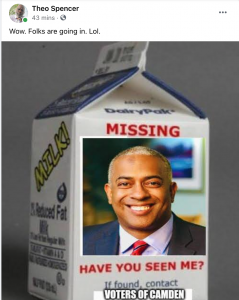Last night’s Camden Mayoral Debate (which you can watch here) felt strikingly familiar — one candidate, Councilwoman Felisha Reyes-Morton, was largely supportive of many of the changes that have come to Camden while a second, School Board Member Elton Custis, was critical. What made it strange was that the frontrunner and party-selected pick (Councilman Vic Carstarphen) was not on stage.
Theo Spencer, who appears to have already dropped out of the race, posted this meme on Facebook. Of course, the tactic of skipping a debate isn’t new to Camden. It’s a typical strategy for the hand-picked frontrunner — only bad things happen at debates for frontrunners. The very act of agreeing gives oxygen that could cause a challenger’s campaign to gain momentum.
 But it also highlighted a strange dynamic in the race. Carstarphen was missing, but Reyes-Morton stepped right into his shoes. While she was critical of the local Democratic Party’s handling of Mayor Frank Moran’s resignation and replacement, she was largely supportive of major policy initiatives such as the increase in charter schools, the “Camden Rising” initiatives that include business subsidies and more.
But it also highlighted a strange dynamic in the race. Carstarphen was missing, but Reyes-Morton stepped right into his shoes. While she was critical of the local Democratic Party’s handling of Mayor Frank Moran’s resignation and replacement, she was largely supportive of major policy initiatives such as the increase in charter schools, the “Camden Rising” initiatives that include business subsidies and more.
It was a familiar dynamic — a candidate with close ties to the Democratic party defending the direction of the city, while a second critiqued it. Except Reyes-Morton is being supported by the Democratic Party. She is, however, an objectively better candidate that Carstarphen. She has more experience, more relevant name recognition (though, as a basketball player, Carstarphen brings some name recognition to the table), a longer record of being community involved, and a natural base of constituents. She executed on these advantages well throughout the debate, returning time and time again to her own experience on school board, planning board, and city council, and explaining what it meant for her constituents. It was the type of effective campaigning you’d expect from a frontrunner or incumbent.
If Camden’s politics weren’t so tilted towards institutional strength (ballot design, incumbency advantages, dollars), Reyes-Morton would absolutely be the front-runner. But as it is, she’s a huge underdog.
All of this matters for Custis. Custis put in a strong performance at the debate. One of his biggest drawing points is that he’s the only person from the progressive caucus who has won city-wide office (his school board seat). That experience was evident. He was well-prepared, clear, and had talking points. He moved adroitly from his personal story to a relatively standard progressive critiques of the systemic failures of Camden’s Democratic leadership.
But Custis faces a dramatic uphill climb. The progressive base in Camden has largely capped out at numbers far short of those necessary to win a primary, and in past races those voters have been split anyway. A debate isn’t going to change Custis’ situation — he needs to pair a compelling, simple message with an extreme effort to reach voters and bring them into the fold. That’s going to require a lot of dollars, and is a much higher lift than Carstarphen, who mostly needs to avoid gaffes, and hope his structural advantages hold.
Yet, there’s a possible angle for Custis if he can consolidate and grow progressive support. That’s because there appear to be fractures along race/ethnic lines surrounding Mayor Frank Moran’s resignation. Two candidates (Luis Quinones and Felisha Reyes-Morton) entered the race specifically in response to the resignation, which carried race/ethnicity connotations. If the established Democratic base divides along racial lines, it leaves an opportunity for Custis to win with 35% of the vote or so — a number much more in reach for the progressive coalition. But if Reyes-Morton draws equally from the progressive base, it is hard to imagine a Custis victory.